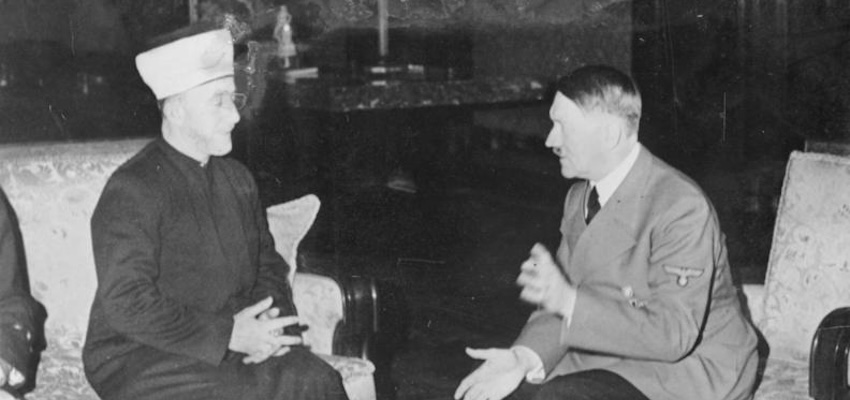
Germany is currently undergoing a shift that I can only describe as catastrophic. Yet again, my country is awash with anti-Semitism, although this time for different reasons.
In Germany and other European countries, Muslim and non-Muslim anti-Semitism is on the rise. Jews are once again no longer safe in public spaces. At demonstrations in Berlin, the cry “Death to the Jews” is often heard. Meanwhile, the much smaller pro-Jewish and pro-Israel demonstrations are broken up by the police, because anti-Semitic reactions might become violent. The state’s concern is realistic. Jews are being repeatedly attacked in the streets.
I have lived as an adult through half of the time that has passed since 1945. Collective imperatives like “Never Again Auschwitz” made anti-Semitism absolutely taboo. As chancellors, Angela Merkel and Olaf Scholz emphasized that Israel’s security was part of the “German raison d’état.” But this former affirmation has not prevented Merkel from criticizing Israel’s war against Gaza today. And since she opened the borders to millions of Muslims in 2015—ultimately justified by the same appeal to Germany’s special responsibility that has for decades reinforced taboos against anti-Semitism—countless Islamists have come and continue to come into the country. Now daily escalations of violence threaten not only Jews. There are regular knife attacks in Germany. On July 3, a Syrian attacked other Syrians with an axe and a hammer on a train traveling through Bavaria. Just days before, a Syrian in Hesse tried to kill the sexton of a church with a five-foot-long crucifix he had torn from the wall.
But it is not the fight against migrant violence that enjoys the highest attention and generous financial support in Germany. Priority is given to the fight “against the right.” In the metropolitan juste-milieu, it is not mass immigration that is openly criticized, but Israel. When Chancellor Friedrich Merz recently declared that Israel was doing the “dirty work” for its Western allies, including Germany, this was at least a break with Germany’s previous niceties toward the mullahs in Iran. Merz’s welcome clarity was met with fierce protests. According to recent reports, he is supporting Gaza with an airbridge and is also taking a more critical stance toward Israel. Because he does not want to form a coalition with the AfD (Alternative für Deutschland), Merz must stand by and tolerate the left’s hostility toward Israel in order to stay in power. Whether we call this political strategy anti-Semitic or not, the end result is a growing climate of hostility toward Jews.
Jewish schools and synagogues have increased their protection. Recently, high school graduates at a Christian school in Göttingen were required to listen to a sermon by an imam during their graduation ceremony. During “Islam Week” at the Christian Albrechts University in Kiel, organized by an Islamic student group, men and women were segregated. A university hospital in Berlin felt compelled to ban a Muslim student society after it also held gender-segregated meetings. Parents of German descent in particular are faced with the growing threat to their children in the schoolyard. Politicians remain silent or resort to ridiculous measures such as banning knives in trains and public places.
Celebrating the seventieth anniversary of the Leo Baeck Institute, President Frank-Walter Steinmeier said in mid-June: “Jews are once again asking themselves whether they are actually safe in the country of the perpetrators of the past.” Two weeks later, Angela Merkel appeared with a select group of well-integrated Syrians and criticized the Germans for their xenophobia. Complaining about “resurgent” anti-Semitism, German political representatives remain silent about the anti-Semitic consequences of the Muslim immigration they themselves are responsible for.
Even a soccer bar in Bielefeld, where an Islamist attacker injured five guests in May, took part in the usual demonstrations “against the right” afterward. Left-wing radical “anti-fascists” and their Muslim friends recently called for “Nazis” to be run over in Berlin-Kreuzberg—and “Nazi” is, as we all know, anyone who is not a left-wing radical. A left-wing alliance of Social Democrats, Greens, and the former East German communists (Die Linke) with close ties to Muslims and Islamists is projected to win next year’s election to the Berlin House of Representatives (its city council), with Die Linke eventually providing the mayor.
How could it come to this? Centuries ago, various German countries helped keep the Ottoman Empire at bay. In Pauline terms, Christianity should be understood as a branch of the tree of Israel. But the majority of Germans have abandoned Christianity and forgotten their spiritual roots in Judaism. Some accuse ordinary Germans of secretly sympathizing with Muslim anti-Semitism. In my view, it is more likely that they have no connection to Jews whatsoever. The European metaphysical heritage ceased to mean much to them before the arrival of the Muslims.
Germany’s apostasy and self-forgetfulness plays a key role in its own downfall. To atone for the Holocaust, the Germans gave up their national identity and a great deal of their cultural heritage. It is this overcorrection and self-abandonment that allowed Angela Merkel to open the borders—not primarily for persecuted Jews and Christians, but for their enemies. The conclusion is as terrible as it is unimaginable: In Germany, Muslim anti-Semitism and hostility toward Christians are emerging from something that was meant to atone for the Holocaust.
Pope and Parliament
The editors discuss Great Britain’s assisted suicide bill, Pope Leo’s first major interview, and Charlie Kirk’s memorial…
Danny Kruger’s Christian Humanism
While the U.S. was reeling from the assassination of Charlie Kirk and its aftermath, across the Atlantic…
Europe After September 10
The days following Charlie Kirk’s assassination have highlighted the stark differences between the U.S. and Europe, especially…
